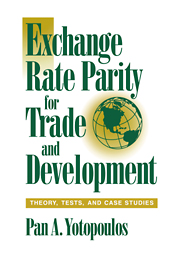Book contents
- Frontmatter
- Contents
- List of Tables and Figures
- Preface
- Part I A review of the terrain
- Part II Theory and empirical analysis
- Part III Successes and failures in development: Good/bad economics and governance
- 9 Japan: Overvaluation without rent-seeking
- 10 The Philippines: Failure in policy and politics
- 11 Financial integration and the refractory role of intervention: Uruguay and Taiwan
- 12 Summary, conclusions, and policy recommendations
- Bibliography
- Index
11 - Financial integration and the refractory role of intervention: Uruguay and Taiwan
Published online by Cambridge University Press: 27 October 2009
- Frontmatter
- Contents
- List of Tables and Figures
- Preface
- Part I A review of the terrain
- Part II Theory and empirical analysis
- Part III Successes and failures in development: Good/bad economics and governance
- 9 Japan: Overvaluation without rent-seeking
- 10 The Philippines: Failure in policy and politics
- 11 Financial integration and the refractory role of intervention: Uruguay and Taiwan
- 12 Summary, conclusions, and policy recommendations
- Bibliography
- Index
Summary
Uruguay is an anomaly for the maintained hypothesis of this book. In 1975 and 1980, the two years for which micro-ICP data are available, Uruguay ranked close to the bottom of the LDC distribution of the RER index (Table 6.1). The expectation of the rate of growth in real GDP per capita that one might have associated with the apparent severe overvaluation of the peso has never been matched by meritorious development performance. Uruguay has certainly not helped the goodness of fit of the endogenous growth regressions (Chapter 7). This is what makes it a good candidate for demonstrating that overvaluation may be a necessary but certainly not a sufficient condition for success in development. The refractory characteristics of good governance have an important role to play in generating development policy outcomes. The ex-post operational definition of good governance is pluralistic economic development. There is general agreement that Uruguay has failed this test (Table 11.1). But defining good governance teleologically, in terms of achieving egalitarian development outcomes, is circular. The crucial question arises: To what extent can one predict ex ante that specific types of intervention are likely not to lead to pluralistic economic development? This is a more difficult task. The issue can best be explored by comparing two sets of interventions and using the good governance case as a control to judge the deviations of the alternative. The control case for this discussion is Taiwan.
The comparison of Uruguay and Taiwan may strike one as unfelicitous. The analytical difficulty arises because the micro-ICP data that are scant for Uruguay are totally nonexistent for Taiwan.
- Type
- Chapter
- Information
- Exchange Rate Parity for Trade and DevelopmentTheory, Tests, and Case Studies, pp. 249 - 281Publisher: Cambridge University PressPrint publication year: 1995



